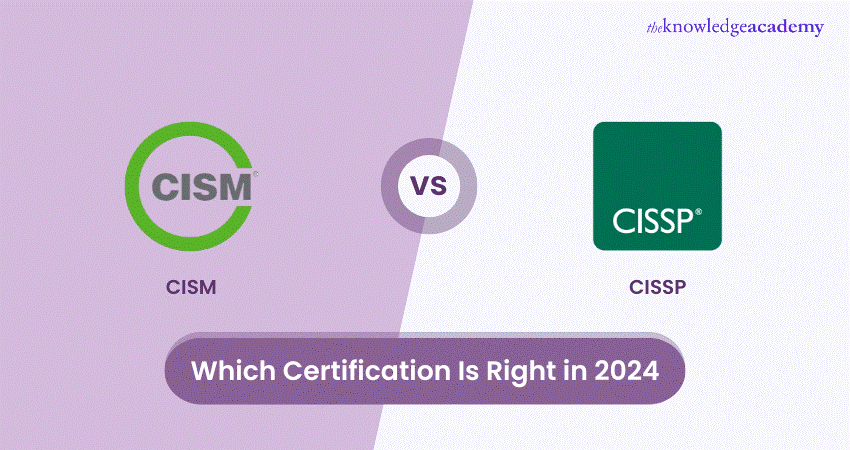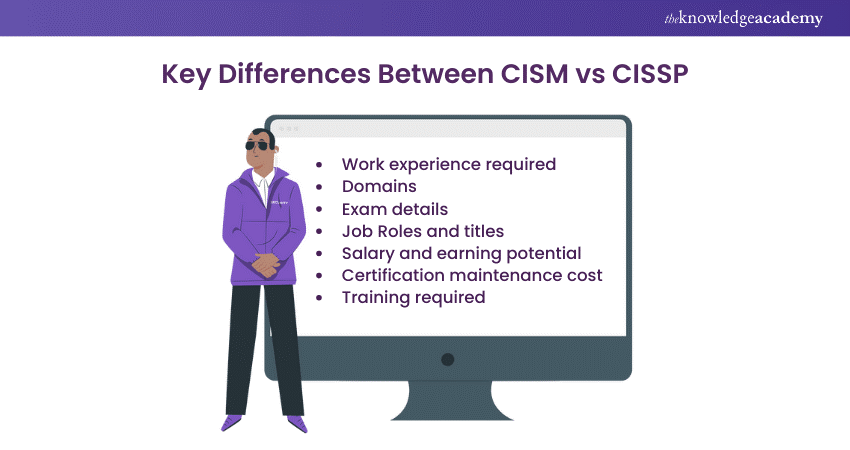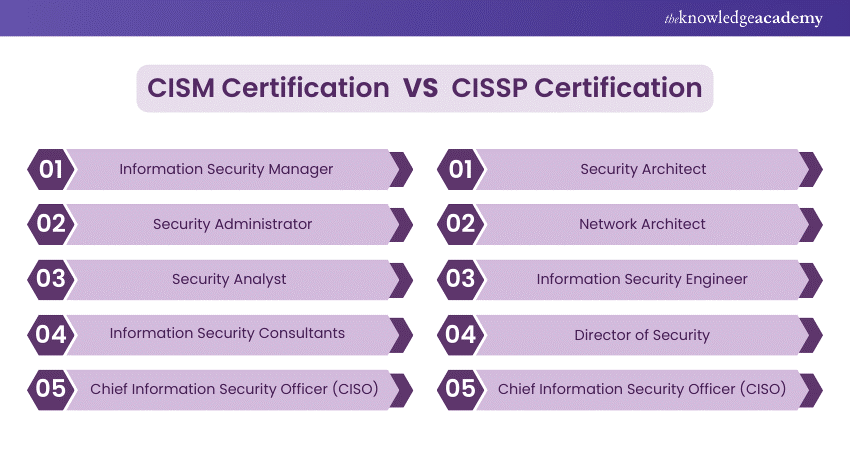We may not have the course you’re looking for. If you enquire or give us a call on +40 316317743 and speak to our training experts, we may still be able to help with your training requirements.
We ensure quality, budget-alignment, and timely delivery by our expert instructors.

If you are already working in cybersecurity or the IT sector, you must have heard about the Certified Information Security Manager (CISM) and Certified Information Systems Security Professional (CISSP) certifications. Professionals often debate CISM vs CISSP to compare its benefits, difficulty level, exam structure, etc. Certifications are a great way to improve credibility and open new opportunities in the industry. Considering ongoing professional development, certification maintenance, such as CISSP Renewal, is equally crucial for sustained career growth.
According to the 2022 Global State of Business Analysis Report by the International Institute of Business Analysis (IIBA), 15% of professionals stated that they earned more than their peers when they have one or more certifications, and 8% also reported that they were promoted at their job. There is a lot of demand for such certifications offered by professional bodies, and getting on helps advance the career. Read this blog to learn the difference between CISM vs CISSP and determine which certificate is easier and best for your career in 2023.
Table of Contents
1) What are CISM and CISSP?
2) Key differences between CISM vs CISSP
a) Work experience required
b) Domains
c) Exam details
d) Job Roles and titles
e) Salary and earning potential
f) Certification maintenance cost
g) Training required
3) Which one is better: CISSP or CISM?
4) Conclusion
What are CISM and CISSP?
Certified Information Security Manager (CISM) is a cybersecurity certification the Information Systems Audit and Control Association (ISACA) offers. This certification indicates your experience in information security, incident and risk management and program development and management. CISM is a highly sought certification because of the benefits and opportunities it provides, and you also learn how to assess information security risks, implement effective management and respond to incidents proactively.
The Certified Information Systems Security Professional, also known as CISSP, is one of the leading cybersecurity certifications offered by the International Information System Security Certification Consortium (ISC)². The CISSP certification indicates your expertise in implementing, designing and managing an efficient cybersecurity system. CISSP offers many benefits in the form of improved recognition, higher salary, support of cybersecurity professionals and more.
Key differences between CISM vs CISSP
While CISM and CISSP are certifications awarded in cybersecurity, they have several differences. The differences aren't just about the professional body but also about the different domains.
Let’s take a detailed look at the differences between CISM vs CISSP.

Work experience required
Both CISM and CISSP are targeted at professionals who have some work experience. Naturally, to qualify for the certification, both require you to have a certain amount of practical work experience.
To become CISM certified it is required to have at least five years of experience in information security in at least three domains. To qualify for the certification, you must have passed the CISM exam within five years from the date of application.
CISSP requires you to have a minimum of five years of experience in two or more of the eight domains, according to the Common Body Knowledge (CBK). However, you get a one-year experience waiver with a four-year college degree or a regional equivalent. You also get the waiver if you have approved credentials from the (ISC)² approved list.
Part-time job experience and paid and unpaid internships are also counted in the work experience, although you must satisfy some conditions regarding the number of hours worked. For full-time work experience, you must have worked 45 hours per week for four weeks to qualify it as one month of experience. For part-time work experience, the hours must be between 20 and 34.
a) 1040 hours of part-time = 6 months of full-time experience
b) 2080 hours of part-time = 12 months of full-time experience
Learn the key processes involved in information security management and get certified with CISSP-ISSAP Training & Certification.
Domains
The four domains in the CISM are given below, along with the weightage for its exam. To qualify for the certification, you must have work experience in any of the following three domains.
a) Information Security Governance (17%)
b) Information Security Risk Management (20%)
c) Information Security Program (33%)
d) Incident Management (30%)
The CISSP Domains and the corresponding weightage for its exam are given below. To qualify for this certification, you must have work experience in two or more domains from this.
a) Security and Risk Management (15%)
b) Asset Security (10%)
c) Security Architecture and Engineering (13%)
d) Communication and Network Security (13%)
e) Identity and Access Management (13%)
f) Security Assessment and Testing (12%)
g) Security Operations (13%)
h) Software Development Security (11%)
Exam details
To qualify for CISSP and CISM, you must first pass the exam. The exam for both is different, and their differences are as follows.

The CISM exam is four hours long, with 150 questions. The questions are in multiple-choice format; to pass the examination, you need to score at least 450. The exam fee is GBP 462 for members and GBP 610.50 for non-members.
The CISSP exam is six hours long with a total of 250 questions. The types of questions that appear in the exam are multiple-choice (MCQ) and advanced innovative questions. You need to score 700 out of 1000 points to pass the examination. You can give the test at any (ISC)² authorised PPC and PVTC Select Pearson VUE testing centres. The table below shows the CISSP Exam Cost:
Want to ace your CISSP interview? Review essential CISSP Interview Questions and prepare like a pro!
Job Roles and titles

Even though both certifications are cybersecurity certifications, the job roles might differ because of the emphasis. CISM focuses on the managerial aspect of information security, while CISSP focuses on technical and managerial aspects.
To understand the difference better, it is essential to point out that CISSP requires more technical knowledge and skills than CISM. While it also focuses on some technical aspects, it is primarily geared towards professionals more apt with a manager role instead of just being good at technological know-how.
If you love working in the technical domain, CISSP is a better choice, while if you like working in managerial positions, CISM is better suited.
Get to the top-level position of CISO with our Chief Information Security Officer Training course and learn how to implement information security framework.
Salary and earning potential
There is no doubt that the salary increases irrespective of the certification. However, earning potential can change based on your chosen roles and responsibilities. Many variables are involved to point out an exact number for the salary, but it is possible to give a rough estimate of average salaries.
The salaries for CISSP and CISM also depend on the certification's demand. Even though getting these certifications can increase your salary, depending on your employer, the hike in salary won't be much as you expect. The real potential of these certifications lies in the opportunities and the job roles open for you. Getting certified gives you access to better job roles that fetch better salaries, and employers are more likely to hire you, giving you a better offer than non-certified individuals. Is CISSP worth it? Absolutely. Achieving CISSP certification not only enhances your skill set and knowledge in the field of information security but also significantly elevates your marketability and career prospects.
Certification maintenance cost
Getting the certification is not enough, you need to maintain your certification as well. To maintain your CISM certification, you need to earn 20 CPE credits per year, 120 CPEs over three years and commit to a Code of Professional Ethics. On the other hand, to maintain your CISSP certification, you need to earn 120 CPEs per three years and pay an annual membership fee of £68 for non-members and £36 for members.
Training required
Getting either the CISM or CISSP certification is not easy, and both need extensive support, CISSP Study Guide and preparation. The domains are less than CISSP's and majorly consist of managerial aspects. This makes preparing for CISM slightly easier but it still needs appropriate training.
Choosing a training institute, boot camp, or virtual classroom training can be a great way to train yourself for the CISM or CISSP certification. For CISSP, there is a CBK that contains all the topics you need to learn and prepare for. Having the ISP CBK can help you immensely in understanding the topics given. CISSP also has more topics to cover as it has eight domains.The CISSP Certification stands out for its comprehensive coverage of information security, with eight domains collectively known as CISSP domains. If you wish, you can prepare on your own with appropriate training materials, but it is better to take help from a training institute that can help you prepare better for the exam.
Download the CISM Certified Information Security Manager Study Guide and ace your exam!
Which one is better: CISSP or CISM?
These two are not opposing certifications, but they can complement each other. If you are certified in CISM, you can also get CISSP certification. The CISM certification can waive off two years of work experience needed for the CISSP certification.
Before choosing the certification, take some time to understand your interest. If you are more inclined towards managerial positions, CISM will be a better choice, whereas if you are interested in technical aspects of information security, you will benefit more from the CISSP certification.
Conclusion
Comparing CISM vs CISSP, you don't need to choose one or the other. You can take both certifications if you wish to. Both can be complementary, albeit with different focuses. Whichever certification you choose, you will reap the benefits of it. Both certificates are highly valued in the IT sector, and your desired certification depends on the path you want to take.
Elevate your skills and protect the digital world with our Information Systems Security Management Training – join Now!
Frequently Asked Questions
Which Certification is Best After CISSP?

After obtaining a CISSP, professionals often consider Certifications like Certified Information Security Manager (CISM), Certified Information Systems Auditor (CISA), or Certified Cloud Security Professional (CCSP) to further specialise and advance their careers.
Is CISSP in High Demand?

After obtaining a CISSP, professionals often consider Certifications like Certified Information Security Manager (CISM), Certified Information Systems Auditor (CISA), or Certified Cloud Security Professional (CCSP) to further specialise and advance their careers.
What are the Other Resources and Offers Provided by The Knowledge Academy?

The Knowledge Academy takes global learning to new heights, offering over 3,000 online courses across 490+ locations in 190+ countries. This expansive reach ensures accessibility and convenience for learners worldwide.
Alongside our diverse Online Course Catalogue, encompassing 19 major categories, we go the extra mile by providing a plethora of free educational Online Resources like News updates, Blogs, videos, webinars, and interview questions. Tailoring learning experiences further, professionals can maximise value with customisable Course Bundles of TKA.
What is the Knowledge Pass, and How Does it Work?

The Knowledge Academy’s Knowledge Pass, a prepaid voucher, adds another layer of flexibility, allowing course bookings over a 12-month period. Join us on a journey where education knows no bounds.
What are Related Courses and Blogs Provided by The Knowledge Academy?

The Knowledge Academy offers various CISSP Training, including the Information Systems Security Management Training, Chief Information Security Officer Training and CISSP Certification. These courses cater to different skill levels, providing comprehensive insights into What is CCSP?
Our IT Security & Data Protection Blogs cover a range of topics related to CISSP, offering valuable resources, best practices, and industry insights. Whether you are a beginner or looking to advance your Cyber Security skills, The Knowledge Academy's diverse courses and informative blogs have got you covered.
Upcoming IT Security & Data Protection Resources Batches & Dates
Date
 CISSP Certification
CISSP Certification
Mon 7th Apr 2025
Sat 19th Apr 2025, Sun 20th Apr 2025
Mon 12th May 2025
Sat 17th May 2025, Sun 18th May 2025
Mon 9th Jun 2025
Sat 21st Jun 2025, Sun 22nd Jun 2025
Mon 14th Jul 2025
Sat 19th Jul 2025, Sun 20th Jul 2025
Mon 11th Aug 2025
Sat 23rd Aug 2025, Sun 24th Aug 2025
Mon 8th Sep 2025
Sat 20th Sep 2025, Sun 21st Sep 2025
Mon 13th Oct 2025
Sat 18th Oct 2025, Sun 19th Oct 2025
Mon 10th Nov 2025
Sat 22nd Nov 2025, Sun 23rd Nov 2025
Mon 8th Dec 2025
Sat 20th Dec 2025, Sun 21st Dec 2025






 Top Rated Course
Top Rated Course




 If you wish to make any changes to your course, please
If you wish to make any changes to your course, please


